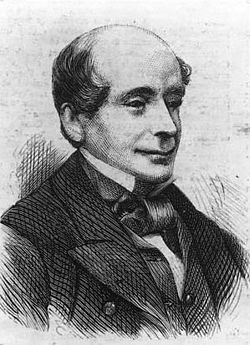James Phillips Kay-Shuttleworth
| Sir James Kay-Shuttleworth, Bt | |
|---|---|

Sir James Kay-Shuttleworth, Bt
|
|
| Born |
20 July 1804 Rochdale, Lancashire, England, United Kingdom |
| Died |
26 May 1877 (aged 72) Kensington, London, England, United Kingdom |
| Nationality | British |
| Parent(s) | Robert Kay |
Sir James Phillips Kay-Shuttleworth, 1st Baronet (20 July 1804 – 26 May 1877) was a British politician and educationist.
He was born James Kay at Rochdale, Lancashire, the son of Robert Kay. He was the brother of Joseph Kay and of Sir Edward Ebenezer Kay.
At first engaged in a Rochdale bank, in 1824 he became a medical student at the University of Edinburgh. Settling in Manchester about 1827, he was instrumental in setting up the Manchester Statistical Society. He worked for the Ardwick and Ancoats Dispensary. While still known simply as Dr. James Kay, he wrote The Moral and Physical Condition of the Working Class Employed in the Cotton Manufacture in Manchester (1832), which was cited by Friedrich Engels in Condition of the Working Class in England in 1844. The experience which he thus gained of the conditions of the poor in the Lancashire factory districts, together with his interest in economic science, led to his appointment in 1835 as poor law commissioner in Norfolk and Suffolk and later in the London districts. In 1839 he was appointed first secretary of the committee formed by the Privy Council to administer the Government grant for the public education in Britain.
In 1840, he founded with E. Carleton Tufnell, the Battersea Normal College for the training of teachers of pauper children. This became the College of St Mark and St John at Battersea, London and later the University College Plymouth St Mark & St John. In 2012 it obtained full university status as the University of St Mark & St John. The original college was the first training college for school teachers; today's system of national school education, with public inspection, trained teachers and its support by state as well as local funds, is largely due to the original founders initiative.
...
Wikipedia
